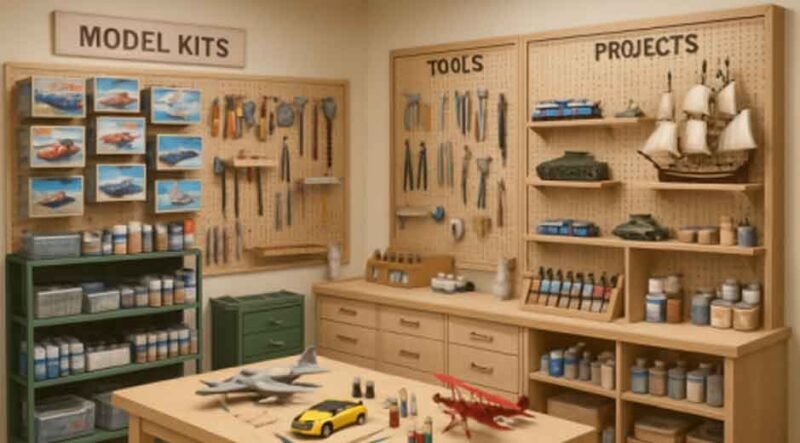Table of Contents
- Planning Your Space
- Essential Features for Your Hobby Shop
- Incorporating Technology and Tools
- Creating a Community Hub
- Maintaining and Evolving Your Space
Key Takeaways
- Designing your hobby shop amplifies creativity and efficiency.
- Strategic use of space, storage, and technology optimizes the workshop experience.
- Creating a communal environment can foster learning and build lasting relationships.
Transforming a part of your home or property into a personalized hobby shop is a rewarding journey that enhances both passion and productivity. Whether you’re a dedicated crafter, a scale model enthusiast, or a hands-on DIY fan, the way you design and use your hobby shop can dramatically boost your enjoyment and results. For anyone embarking on this process, working with a Hobby Shop Builder can provide valuable insights and expert guidance to ensure your space meets your unique needs.
Thoughtful planning and wise design choices will help you create a functional and inviting workshop. With endless creative layout options, the right storage, and a touch of personal flair, your hobby shop will become your favorite place to spend time. For hobbyists serious about their craft, making the right decisions early on pays off in comfort, organization, and inspiration throughout the years.
Planning Your Space
Begin your hobby space transformation by evaluating the available area. Map out the dimensions and think creatively about how every corner can serve your interests, from work zones tailored to different activities to clear walkways and well-placed natural light. The Spruce notes that your hobby space doesn’t have to be a separate room; it can be as cozy as a nook at the kitchen table, a tucked-away closet (just clear it out and add a small desk), or even a span of your garage or basement cleared and prepped for creative use.
Ergonomic chairs and adjustable desks make a world of difference for extended sessions, reducing fatigue and physical strain. Keep the flow intuitive by placing frequently used tools and supplies within easy reach, while storing less frequently used items in less accessible areas.
Assessing the specific requirements of your hobbies, whether that means space for large-scale models, a dust-free table for painting, or a dedicated area for electronics, is vital. Planning and using versatile solutions, such as portable carts or folding furniture, not only saves space but also avoids costly reconfigurations later, laying a strong foundation for a flexible and enjoyable hobby haven.
Essential Features for Your Hobby Shop
Organization is the heartbeat of any creative workshop. Implementing versatile storage solutions, such as custom shelving, modular cabinets, and pegboards, will help keep every tool and material in its designated place. For projects that require precise work or complex assembly, dedicated workstations with solid surfaces and adjustable heights are invaluable. Additionally, prioritize proper lighting—task lamps, LED overhead panels, and natural light sources all help to improve accuracy and reduce eye fatigue during intricate tasks.
- Multi-level Shelving: Maximize horizontal and vertical space for materials and reference books.
- Mobile Storage Carts: Allow flexibility to move essential supplies wherever needed.
- Display Areas: Showcase finished projects and stay motivated as you build new creations.
Incorporating Technology and Tools
Modern technology brings new opportunities to enhance your hobby experience. Setting up a computer workstation enables you to plan projects, access tutorials, and manage designs digitally. Investing in high-quality, hobby-specific tools ensures greater accuracy and satisfaction. For example, laser cutters, 3D printers, or advanced airbrush systems can vastly expand creative possibilities in a well-equipped shop.
Embracing Smart Devices
Smart gadgets, such as voice assistants and inventory apps, streamline the management of supplies, while energy-efficient climate controls maintain comfort throughout every season. Staying organized digitally can further boost productivity and help you track resources, project deadlines, and even instructional videos.
Creating a Community Hub
Transforming your hobby shop into a gathering place for friends, family, or local enthusiasts opens up opportunities for growth and connection. Hosting workshops, themed project nights, or skill-sharing sessions brings fresh perspectives and encourages camaraderie. In fact, retailers who organize regular hobby events see a notable increase in engagement and loyalty, according to industry research. Sharing expertise and experiences fosters a sense of community and enables everyone to improve their skills more quickly.
Ideas for Community Engagement
- Monthly meetups focused on different techniques or project types
- Collaborative mural or model builds
- Beginner-friendly sessions for new hobbyists
Not only do these gatherings foster friendships, but they can also introduce you to fresh trends and styles. For an in-depth perspective on how shared creative spaces can impact learning and wellbeing.
Maintaining and Evolving Your Space
To make the most of your hobby shop over the long run, consistent upkeep is key. Revisit your layout periodically, adjusting storage, lighting, and equipment placement to accommodate your evolving workflow. Staying organized not only simplifies cleanup but also helps you maintain focus on creating. Embrace new tools or rearrange work areas as your skills and interests evolve, as change often sparks inspiration. Flexibility will keep the space vibrant and motivating for years.
A well-planned hobby shop is more than a place to work. It is a personal retreat that fuels your creativity, brings your ideas to life, and fosters connections with others who share your passion.








